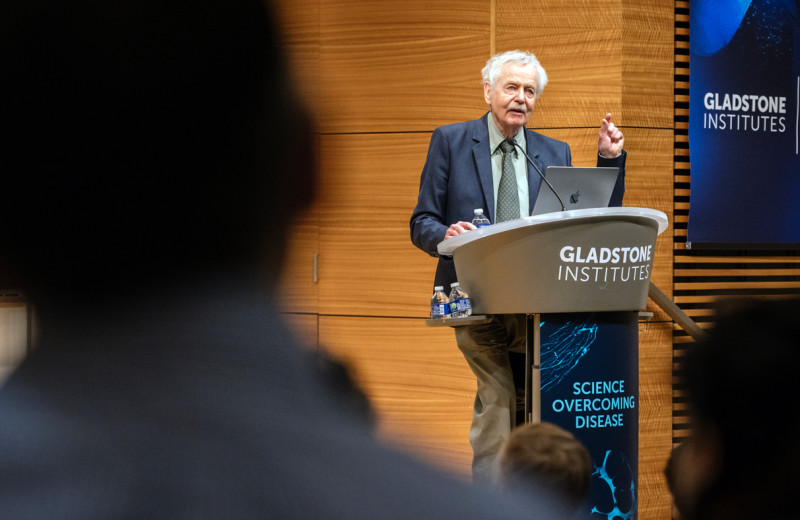Gladstone NOW: The Campaign Join Us on the Journey✕

Katerina Akassoglou is selected as the 2018 recipient of the Barancik Prize for Innovation in Multiple Sclerosis Research.
Katerina Akassoglou, PhD, a senior investigator at Gladstone Institutes, is the 2018 recipient of the Barancik Prize for Innovation in Multiple Sclerosis Research. She was recognized for her relentless pursuit of an original line of research and her tenacious dedication to the development of therapies for multiple sclerosis, according to a press release from the National Multiple Sclerosis Society, which administers the prize.
“I’m humbled and deeply honored to win the Barancik Prize and truly grateful to the committee for recognizing the innovation and translational potential of our work,” said Akassoglou in the release, who is also a professor at UC San Francisco. “Our findings shed new light on mechanisms of brain damage in multiple sclerosis, and introduced novel imaging technologies to study the interactions between the brain, immune system, and the vasculature. Translating findings into treatments is a cornerstone of our research program, and we are committed to developing new therapies for multiple sclerosis.”
Akassoglou studies the role of blood proteins in the development of a variety of neurological diseases, including stroke, Alzheimer’s disease, spinal cord injury, and multiple sclerosis. Her team demonstrated that when the blood-brain barrier is damaged, the blood-clotting factor fibrin reaches the brain and can activate immune cells known as microglia. This causes inflammation and, eventually, the nerve damage associated with multiple sclerosis. The team went on to show that in mice, an antibody against fibrin could reduce microglia activation and the subsequent damage to nerve fibers.
“We are very proud that Katerina has received this prestigious prize,” said Gladstone President Deepak Srivastava, MD. “This honor is very well deserved, given that her work has been instrumental in showing the important role of blood factors in many diseases of the nervous system, including multiple sclerosis, spinal cord injuries, and Alzheimer’s disease.”
Akassoglou is now translating this finding into potential therapies for multiple sclerosis aimed at reducing fibrin’s ability to cause nerve damage without impairing its critical function in blood clotting. Her work shows that targeting fibrin has the potential to protect against nerve damage at both early and late stages of the diseases, with important implications for patients facing multiple sclerosis disability and progression.
The Barancik Prize for Innovation in Multiple Sclerosis Research rewards exceptional innovation and originality in research relevant to multiple sclerosis, emphasizes research leading to the development of treatments or cures for the disease, and identifies future leaders in multiple sclerosis research.
Read More about Katerina Akassoglou's Recent Discoveries
Support Discovery Science
Your gift to Gladstone will allow our researchers to pursue high-quality science, focus on disease, and train the next generation of scientific thought leaders.
Gladstone Scientist Nadia Roan Elected to American Academy of Microbiology
Gladstone Scientist Nadia Roan Elected to American Academy of Microbiology
Roan has made great strides in understanding how persistent viruses including HIV cause disease and how immunity to viruses shapes human health.
Awards News Release COVID-19 HIV/AIDS Infectious Disease Roan LabA Sculptor of Modern Regenerative Medicine
A Sculptor of Modern Regenerative Medicine
Among his myriad accomplishments, Rudolf Jaenisch—winner of the 2025 Ogawa-Yamanaka Stem Cell Prize—was the first to demonstrate the potential of induced pluripotent stem cells to treat disease.
Awards Ogawa Stem Cell Prize Profile Regenerative Medicine Stem Cells/iPSCsSix Gladstone Scientists Named Among World’s Most Highly Cited Researchers
Six Gladstone Scientists Named Among World’s Most Highly Cited Researchers
The featured scientists include global leaders in gene editing, data science, and immunology.
Awards News Release Corces Lab Doudna Lab Marson Lab Pollard Lab Ye Lab





